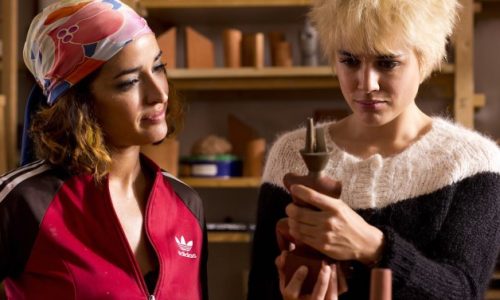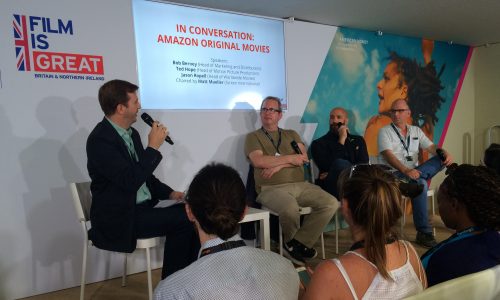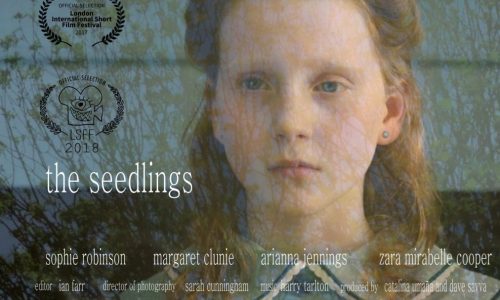
After yesterday’s experience of having had the cereal-bar police separate me from my breakfast on arrival at the Grand Theatre Lumiere, this morning I was munching on raisins during my brisk walk down to the press screening of Pedro Almodóvar’s Julieta. Indigestion aside, I arrived in good time, and found a seat – next to fellow British critic – and fellow British Jason – Jason Solomons. Annoyingly, there were heads in front of us which wouldn’t normally cause problems, since they didn’t cover the screen – but they did block the space below; films that aren’t in English or French will usually have French subtitles on the screen and English subtitles in a bar underneath. This makes seeing such films difficult, since my instinct, in this case, is to listen to the Spanish and if I don’t understand it (I can order a lenguado con patatas fritas, por favor at a restaurant – but understanding Spaniards talking to each other is something else entirely) my instinct is to scan the French subtitles (I can order poisson du jour at a restaurant but six days a year of speaking French isn’t really enough to keep it up to scratch) and only then do I switch to the English subtitles, which – by then – will at best be blocked from view by the heads in front of me or at worst be gone, moved onto the next line of Spanish dialogue I can’t quite understand.
That aside, Julieta was typically Almodóvar – a very much female led drama, sumptuously shot in bold colours, tackling themes of love, loss and guilt. One of the first things film-makers are taught is to “show, don’t tell” – but there’s somewhat more telling going on here than showing, as it’s framed as a letter, written by a middle-aged mother to her estranged daughter, as a means of trying to reconnect with her past and work out for herself how she got to where she finds herself.

Next it was the all-important check-in at the UK Film Centre, where I caught a seminar about how Amazon is making headway into the feature film market, with the aim of eventually being a major studio presence in Hollywood. Already, it boasts, it’s involved in five films in this year’s Official Selection in Cannes, including Woody Allen’s opening film, Cafe Society, Drive director Nicolas Winding Refn’s Neon Demon and both of the Jim Jarmusch films. “The cinema gods are smiling on us this year,” laughs Amazon’s Head of Motion Picture Production, Ted Hope, a producer whose previous work has been supporting some of America’s best-known independent film-makers. He wants their films to be “ambitious” and says they should “cut through the noise” in the business. “Ultimately, we want to please our customers,” he acknowledges. There’s a lot of talk about newcomers to the industry and a rival – who remained unnamed at the event, but which has recently produced Ricky Gervais’s Special Correspondent – is currently sticking to the small screen. Not so for Amazon. “We believe in the romance of the theatrical experience,” enthused Amazon’s Head of Worldwide Movies, Jason Ropell. Amazon aims to make 12 theatrical films a year and wants them to have what the panel described as “take away.” Hope explained. “We want to make films that will still matter ten years from now. You want them more than just to kill time.”
Then it was time to get back to watching films and there was some unusually commercial Cannes fare, screening out of competition, from Shane Black, returning to Kiss Kiss Bang Bang territory for another comedy crime cape, The Nice Guys. Russell Crowe and Ryan Gosling play rival private detectives who team up to find a missing porn star, who’s caught up in a political conspiracy to protect car companies from anti-pollution legislation. It’s a pacy comedy, full of Black’s typical one-liners and intricately choreographed action sequences, but the plot is far from convincing and the headcount is as high as many of the deaths are shocking – sometimes appropriately but often gratuitously.

Deep in the bowels of the Palais is a section of the market devoted to short films, largely populated by young directors and producers, hoping that their exposure will help them strike a deal to jump up to features. When I bumped into South Londoner Christina Yianni in the Short Film Corner, she was discussing her period drama The Seedlings with a group of other short-film makers – and that’s one of the big drawbacks of the Short Film Corner; it’s more of a networking place for young directors who are competing against each other for funding than it is a place where the film-makers can actually find that funding. Christina said she’d learned a lot from her first Cannes and found the experience invaluable.
On the way from work-day to evening, I made one more pass through the Riviera to find a sales agent I’d hoped to speak to about one of my own film-making projects. I’d been drawn to Parkland, partly because they were selling the latest film from Martin Stitt – the film-making friend I reconnected with on the train from the airport to Cannes. It turns out that he wasn’t the only one I knew with links to Parkland. At the Amazon panel, I was chatting to Pierre-Louis Manes, the advertising accounts manager at Screen International – and a former sales agent – with Parkland. Earlier in the day, I’d been crossing the market when I bumped into Brian Barnes again, as he was pitching to them. And moments after I arrived to chat with them, I looked round and saw another friend had turned up to speak to them; James Partridge is a fellow film journalist from New Zealand, who’s also setting up a Kiwi film fund and trying to attract international business to his country. All roads lead to Parkland, it seems.
Now it was time to start the evening. Party one was staged by Keller Edde Studios, who’d hired out half of the Plage Royale beach club to promote three films on their slate – an eponymous Genghis Khan biopic, a film about the American-Lebanese artist and poet, Khalil Gibran and one of the official “out of competition” selections in Cannes, Robert De Niro’s boxing drama Hands of Stone. They also announced a new film, in development, Rose in Winter, about Edith Stein, a Jewish woman in wartorn Germany who converted to Catholicism, became a nun, but was still taken off to Auschwitz and murdered by the Nazis. She was later made a Saint by Pope John Paul the Second.

We didn’t have far to travel to the next reception – hosted by Creative Scotland. It was on the other side of a canvas screen, in the other half of the same venue. But to get there, security sent me back up onto the street, where I had to sign in and get a second wrist-band before I could go back down to the beach. Everyone who’s anyone in the Scottish film industry was there, eager to promote the country as a centre for film-making. There were speaches from the head of the Edinburgh Film Festival and his refreshingly frank counterpart from Glasgow, Alison Gardner. “Our submissions have just opened, if you didn’t get into Edinburgh,’ she laughed, boasting that her festival has a higher proportion of its selection than most coming from submissions, rather than invitations. One piece of advice to hopeful film-makers – if you can keep Alison’s mind off her ironing, then you’re in with half a chance. I also spoke to creative Scotland’s Brodie Pringle, who excitedly told me about the impending studio expansion at Ward Park, where planning permission has been granted to build an extra two sound stages at the four-studio complex, currently used for the TV show Outlander. A new Growth Fund has also been set up to help up to 7 feature films that shoot in Scotland, with grants of at least £250,000. The hosts were also pleased to congratulate the Scottish director David Mackenzie – previously referred to on this site as British – for his first wholly American production, Hell or High Water, which screened last night in the Un Certain Regard section. His chief selling point was being a European giving his outsider’s perspective on American culture, so I suggested that I had done the same with my own short film, 2 Hour Parking, which satirised Hollywood’s crazy parking rules. “Yes,” he laughed. “You’ve got to move your car from 3am to 6am for street cleaning!”
Then came an unexpected last minute invite for the party staged in promote Almodóvar’s latest competition entry, allowing me to start the day as I ended it, with Julieta. The only problem was that it was so last minute that by the time I arrived, the food had run out. That’s not entirely true. There was a table full of desserts – inside the VIP area. I’m not sure whether the security guards were protecting the talent of the cakes – but either way, it seems that security in Cannes is more worried about food than anything else. Starting and ending not just with Julieta – but run-ins with security guards over food.
